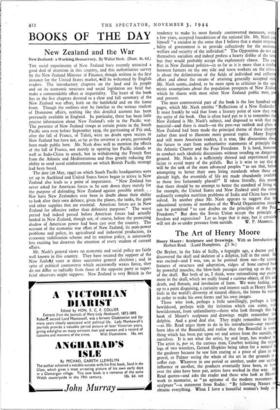BOOKS OF THE DAY
New Zealand and the War
New Zealand: a Working Democracy. By Walter Nash. (Dent. Ss. 6d.)
THE social experiments of New Zealand have recently attracted a good deal of attention in this country, and this authoritative survey
by the New Zealand Minister of Finance; though written in the first
instance for the United States market, Will be welcomed by English readers. The introductory chapters on the land and its people
and on its economic structure and social legislation are brief but make a commendable effort at impartiality. The heart of the book lies in the five chapters devoted to a clear and full summary of the New Zealand war effort, both on the battlefield and on the home front. Though the outlines may be familiar to the serious student of Dominion affairs, nothing like this detailed account has been previously available in England. In particular, there has been little precise information about New Zealand's role in the Pacific war. The presence of New Zealand troops at certain points in the South Pacific area even before September 1939, the garrisoning of Fiji and, after the fall of France, of Tahiti, were no doubt open secrets in New Zealand but have not, so far as the reviewer is aware, previously been made public here. Mr. Nash does well to mention the effects of the fall of France, not merely in opening her Pacific islands as well as Indo-China to attack, but in withdrawing the French fleet from the Atlantic and Mediterranean and thus greatly reducing the ability to send naval reinforcements on which British Pacific strategy had been based.
The date (26 May, 1944 on which South Pacific headquarters were set up in Auckland and United States forces began to arrive in New Zealand also leads to a point of importance. " New Zealand has never asked for American forces to be sent down there merely for the purpose of defending New Zealand against possible attack.. . Nor have New Zealanders ever been in doubt about their ability to look after their own defence, given the planes, the tanks, the guns and other supplies that are essential. American forces are in New Zealand for offensive rather than defensive purposes." The worst period had indeed passed before American forces had actually landed in New Zealand, though not, of course, before the protecting shadow of American power had been cast over the country. The account of the economic war effort of New Zealand, its man-power problems and policy, its agricultural and industrial production, its economic stabilisation scheme and its taxation policy, is necessarily less exciting but deserves the attention of every student of current affairs.
Mr. Nash's general views on economic and social policy are fairly well known in this country. They have secured the support of the New Zealaild voter at three successive general elections ; and in spite of political controversy which occasionally waxes fierce, they do not differ so radically from those of the opposite party as super- ficial observers might suppose. New Zealand is very British in the
tendency to make its most fiercely controverted measures, ma a few years, accepted foundations of the national life. Mr. Nash ca himself "a socialist in the sense that I believe that a major respoa bility of government is to provide collectively for the econ welfare and security of the individual." The Opposition do not themselves socialists and indeed profess a hearty dislike of the to but they would probably accept the explanatory clause. The co flict in New Zealand politics—in so far as it is more than a confl between farmers on the one side and town workers on the other is about the delimitation of the fields of individual and collecti effort and about the means of attaining generally accepted end Mr. Nash seems,.indeed, to be most open to criticism in the op mistic assumptions about the population prospects of New Zeala which he shares with most other New Zealand public men, pa and present.
The most controversial part of the book is the last hundred od pages, which Mr. Nash entitles "Reflections of a New Zealander. It must frankly be said that from a literary point of view they m the unity of the book. One is often hard put to it to remember th New Zealand is Mr. Nash's subject, and disposed to wish that th material—and there is much—on the post-war outlook and plans New Zealand had been made the principal theme of these chapte rather than used to illustrate more general topics. Many Englis and still more American readers, it is true, like discussions a the future to start from authoritative statements of principle I. the Atlantic Charter and the Four Freedoms. It is hard, howev to conduct such idealistic discussions without treading on dangero ground. Mr. Nash is a sufficiently shrewd and experienced pol tician to avoid many of the pitfalls. But is it wise to say that will be the task of the more advanced peoples " to see that, befo attempting to better their own living standards when these ar already high, the essentials of life are made abundantly availab to those less fortunately placed?" If taken literally, this mea that there should be no attempt to better the standard of living for example, the United States and New Zealand until the extr ordinarily complex nutrition problems of India and China have bee solved. In another place Mr. Nash appears to suggest that th educational systems of members of the World Organization shou not be permitted " to cast doubts on the principles of the Fo Freedoms." But does the Soviet Union accept the principle freedom and expression? Let us hope that it may, but it certainl will not do so under pressure from outside. W. P. MORRELL.


























 Previous page
Previous page